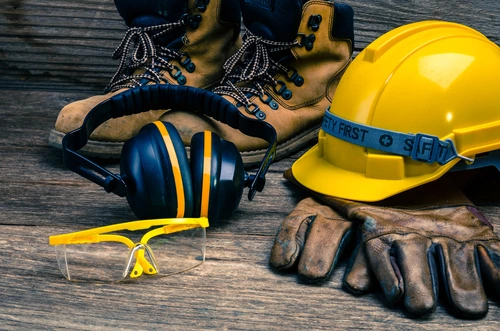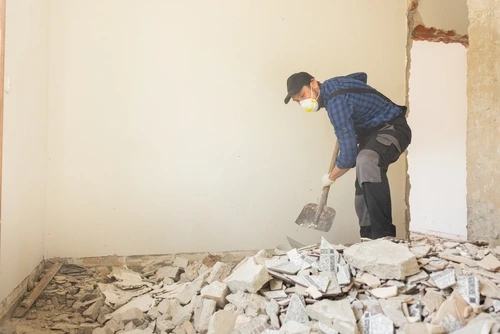Construction projects generate vast amounts of debris, and proper disposal is crucial for maintaining a safe and efficient work environment. The top 5 types of construction debris that typically require a dumpster are concrete, wood, metal, drywall, and roofing materials. Each of these materials presents unique challenges in terms of weight, volume, and disposal requirements.
Choosing the right dumpster for your construction project is essential for effective waste management. Different sizes and types of dumpsters are available to accommodate various debris types and project scales. From 10-yard containers suitable for small renovations to 40-yard dumpsters for large-scale commercial construction, selecting the appropriate size can significantly impact your project’s efficiency and cost-effectiveness.
Proper disposal of construction debris not only keeps your worksite clean but also contributes to environmental sustainability. Many materials can be recycled or repurposed, reducing the overall environmental impact of your project. By understanding the types of debris you’ll generate and planning accordingly, you can ensure a smoother, more eco-friendly construction process.
 Proper safety practices and regulatory compliance are crucial when handling construction debris in dumpsters. Following guidelines protects workers and ensures legal adherence.
Proper safety practices and regulatory compliance are crucial when handling construction debris in dumpsters. Following guidelines protects workers and ensures legal adherence.
 Construction debris poses significant environmental challenges. Adopting sustainable practices and proper waste management techniques can greatly reduce the ecological footprint of construction projects.
Construction debris poses significant environmental challenges. Adopting sustainable practices and proper waste management techniques can greatly reduce the ecological footprint of construction projects.
Key Takeaways
- Identify the main types of construction debris to choose the right dumpster size
- Proper waste management enhances worksite safety and efficiency
- Sustainable disposal practices can reduce your project’s environmental impact
Understanding Construction Debris
Construction debris encompasses a wide range of materials generated during building, renovation, and demolition projects. Proper management of this waste is crucial for environmental protection and regulatory compliance.Types of Construction Waste
Construction sites produce various types of debris. Common materials include concrete, wood, drywall, metals, and plastics. Concrete and masonry are heavy materials often recycled or repurposed. Wood and drywall are frequently generated in residential projects. Metals like steel, copper, and aluminum are valuable and recyclable. Plastics from packaging and construction materials require careful sorting. Hazardous materials such as asbestos or lead-based paint need specialized handling. Insulation, glass, and roofing materials are also common in construction waste. Each type requires different disposal methods, making proper identification essential for effective waste management.Importance of Proper Disposal
Proper disposal of construction debris is critical for several reasons. It helps protect the environment by reducing landfill waste and conserving resources through recycling. Efficient management is key for both health and environmental considerations. You must comply with local regulations when disposing of construction waste. Improper disposal can lead to fines and legal issues. Recycling materials like metal and concrete can also reduce project costs. Using the right dumpster size for your project ensures efficient waste removal. It helps prevent overloading and multiple trips, saving time and money. Proper sorting of materials on-site facilitates easier recycling and disposal processes.Choosing the Right Dumpster for Your Project
Selecting the appropriate dumpster is crucial for efficient waste management on construction sites. The right choice depends on factors like project size, debris types, and site constraints.Assessing Dumpster Sizes and Types
Roll-off dumpsters are the most common choice for construction projects. They come in various sizes, typically ranging from 10 to 40 cubic yards. A 10-yard dumpster suits small renovations, while a 40-yard container is ideal for large-scale demolitions. For heavy materials like concrete or soil, consider a heavy debris dumpster. These have reinforced walls and floors to handle extra weight. Some projects may require specialized containers for hazardous materials or recyclables. Always check local regulations regarding dumpster placement and permits. Some areas restrict dumpster sizes or require special permissions for street placement.Determining the Appropriate Dumpster Size
To choose the right dumpster size, estimate your total waste volume. A good rule of thumb: one room of renovation debris usually fits in a 10-yard container. For whole-house renovations, you’ll likely need a 30 or 40-yard dumpster. Consider the types of debris you’ll generate:- Bulky items like furniture require larger containers
- Dense materials like concrete fill up space quickly
- Light materials like drywall take up more volume
Safety and Regulations
 Proper safety practices and regulatory compliance are crucial when handling construction debris in dumpsters. Following guidelines protects workers and ensures legal adherence.
Proper safety practices and regulatory compliance are crucial when handling construction debris in dumpsters. Following guidelines protects workers and ensures legal adherence.
Navigating Local Regulations
Local regulations vary widely for construction waste disposal. Check with your municipality for specific rules on dumpster placement and permitted contents. Many areas require permits for dumpsters on public property. Some materials may be prohibited from standard dumpsters. Hazardous waste often requires special handling and disposal methods. Be aware of restrictions on materials like asbestos, lead paint, or chemicals. Fines can result from improper disposal. Educate your team on local requirements to avoid penalties. Proper sorting of debris is often mandated to facilitate recycling efforts.Implementing Safety Measures on Site
Safety should be a top priority when using dumpsters on construction sites. Provide proper personal protective equipment (PPE) for all workers handling debris. This includes gloves, safety glasses, and steel-toed boots. Train employees on safe lifting techniques to prevent injuries. Use mechanical aids like wheelbarrows or forklifts for heavy items when possible. Ensure clear pathways to the dumpster to reduce trip hazards. Regularly inspect the dumpster area for potential dangers. Keep the area well-lit and free of obstacles. Secure loose materials to prevent them from falling or blowing away. Properly cover the dumpster when not in use to prevent unauthorized dumping and protect contents from the elements.Costs and Considerations for Dumpster Rental
Renting a dumpster for construction debris involves several key factors that impact pricing and service quality. Understanding these elements will help you make an informed decision and manage your project costs effectively.Understanding Dumpster Rental Services
Dumpster rental services offer various options to suit different project needs. Roll-off dumpsters are commonly used for construction debris due to their large capacity and easy loading. When selecting a service, consider:- Dumpster sizes (typically 10, 20, 30, or 40 cubic yards)
- Rental duration (usually 7-10 days with extension options)
- Weight limits and overage fees
- Prohibited materials
Calculating Disposal Costs
Dumpster rental costs vary based on several factors:- Dumpster size
- Rental duration
- Type of debris
- Location
- Disposal fees
- Determine the amount and type of debris you’ll generate
- Choose an appropriate dumpster size
- Calculate the rental period needed
- Factor in potential overage fees
Environmental Impact and Sustainable Practices
 Construction debris poses significant environmental challenges. Adopting sustainable practices and proper waste management techniques can greatly reduce the ecological footprint of construction projects.
Construction debris poses significant environmental challenges. Adopting sustainable practices and proper waste management techniques can greatly reduce the ecological footprint of construction projects.
Minimizing the Environmental Footprint
Construction waste contributes substantially to landfill volumes. To minimize this impact, prioritize material selection and management. Choose eco-friendly materials like recycled steel and reclaimed wood. Implement careful planning to reduce excess materials. Proper sorting of debris is crucial. Separate recyclable materials from non-recyclable waste. This practice facilitates easier recycling and reduces the amount sent to landfills. Consider on-site recycling when possible. Crush concrete for use as aggregate in new projects. Mulch wood waste for landscaping. These methods reduce transportation emissions and conserve resources.Adopting Sustainable Waste Disposal Methods
Sustainable construction practices are essential for responsible waste management. Rent a yard waste dumpster for green debris like branches and leaves. This ensures proper composting or mulching of organic materials. Partner with recycling facilities that specialize in construction waste. They can process materials like metals, plastics, and glass more efficiently. This approach diverts a significant portion of debris from landfills. Explore innovative recycling methods. Some companies now turn drywall into soil amendments or use crushed glass in road construction. By seeking out these options, you contribute to a circular economy in construction.Frequently Asked Questions
Construction debris disposal requires careful consideration of regulations, project size, and material types. Proper planning ensures efficient waste management and compliance with local laws.Which materials are typically prohibited from disposal in a construction dumpster?
Most construction dumpsters prohibit hazardous materials, including asbestos, lead-based paint, and chemicals. Electronics, appliances, and tires are often restricted as well. Always check with your local waste management guidelines for a complete list of prohibited items.How does one choose the appropriate dumpster size for a construction project?
To select the right dumpster size, estimate your project’s waste volume. Consider the type of debris and project duration. Small renovations may require a 10-yard dumpster, while large construction projects might need 30 or 40-yard containers. Consult with a waste removal professional for accurate sizing.Are there special guidelines for disposing of hazardous construction materials?
Hazardous materials require specialized disposal methods. Contact your local environmental agency for proper handling procedures. Some materials may need to be separated and disposed of at designated facilities. Always prioritize safety and compliance when dealing with hazardous construction waste.What’s the process for renting a construction dumpster for debris removal?
To rent a construction dumpster, start by determining your project’s needs. Contact a reputable waste removal company to discuss size options and rental duration. Provide details about your project and debris types. Schedule delivery and pickup dates, ensuring proper site access for the dumpster.How should demolition debris be sorted before placing it in a dumpster?
Sort demolition debris by material type before disposal. Separate recyclable materials like metal, wood, and concrete. Remove any hazardous materials and dispose of them properly. Sorting waste can reduce disposal costs and promote recycling efforts.RECENT BLOGS
 A Homeowner’s Guide to Flash Flood Preparation, Cleanup, and Long-Term Protection
A Homeowner’s Guide to Flash Flood Preparation, Cleanup, and Long-Term Protection
Date: May 27 ,2025
 Everything You Need to Know About Garbage Bin Rental: Sizes, Costs, and Practical Tips for Every Project
Everything You Need to Know About Garbage Bin Rental: Sizes, Costs, and Practical Tips for Every Project
Date: May 14 ,2025
 Safe Disposal Methods for Refrigerators: Recycling, Donation, and Removal Options
Safe Disposal Methods for Refrigerators: Recycling, Donation, and Removal Options
Date: April 29 ,2025
Our Reviews
LATEST BLOGS








